Jennings loses appeal
Page 14

If you've noticed an error in this article please click here to report it so we can fix it.
• Wrexham-based Jennings Haulage and one of its drivers have lost appeals against fines imposed for overloading by Chester magistrates.
The company had appealed to Chester Crown Court against fines of £210 and 2150 imposed for two axle overloading offences. Driver James Barlow, of Johnstone, near Wrexham, had also appealed against fines of £75 imposed on him for each offence.
The court was told that a vehicle carrying concrete blocks had been stopped in a weight check on the A5117 road at Chester and, when weighed, the first axle had had an overload of 440kg and the second axle had had an overload of 640kg. During the course of inquiries, the company had written a letter explaining that the vehicle had been loaded incorrectly by someone else. It was the prosecution view, however, that overloading was an absolute offence, imposing a clear duty on the driver and owner of a vehicle to ensure that it was not overloaded.
Asked why the company and driver were appealing, when the fines imposed were so insignificant when compared with the maximum penalty of £2,000 per offence, Jonathan Lawton, defending, said the company was concerned because it did not consider itself to be blameworthy, and because these were notifiable convictions that could put its operator's licence in jeopardy.
Lawton said that the letter of explanation had been written before proceedings had commenced and he thought that it was discraceful that there had been no reply or acknowledgement apart from a summons. The company had been asked to collect a loaded vehicle from a customer. After the vehicle had been stopped in the weight check, it had been discovered that when the vehicle had been loaded, an additional package of solid blocks of concrete had inadvertently been loaded among the packs of hollow blocks.
Though the public was entitled to expect a very high duty of care, it ought not to be one that was beyond attainment, said Lawton. Nobody could have known that these offences were likely to happen. The company could do no more than send a competant driver with an adequate vehicle.
Dismissing the appeals, and ordering the company to pay £120 costs, Phillips said that Jennings' driver should have been able to tell that there had been a 10% overload.










































































